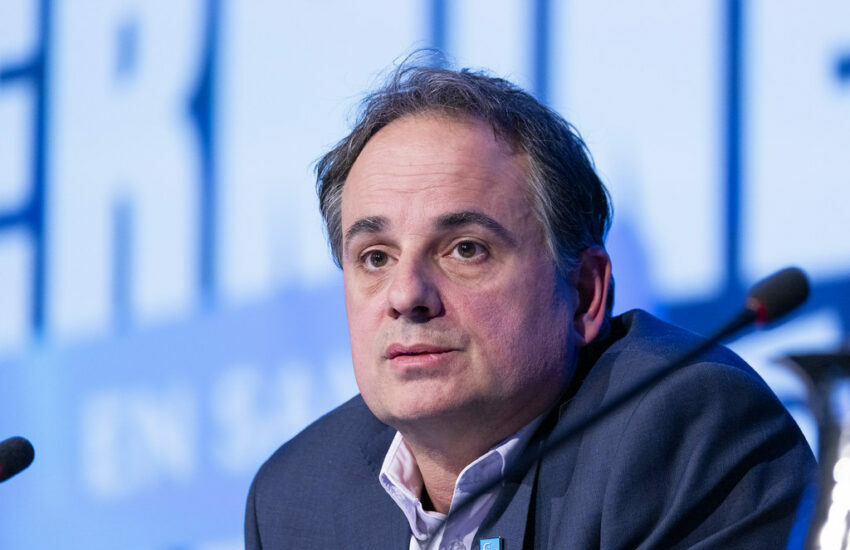
Federal Council on December 9, 10, 11 and Special convention on December 12, 2024
Message from the President

This past year has been very eventful to put it mildly: we mobilized all across Quebec and we participated in strenuous negotiations almost all year and finally signed the texts of our new collective agreement, which came into force on December 15, 2024. As we expected, the Coalition Avenir Québec government then continued to give us a run for our money with the implementation of Santé Québec, the announcement of budget cuts and the reform of the collective bargaining process in the public and parapublic sectors.
This week, the FIQ Executive Committee and your union representatives from all across Quebec met to discuss strategic planning, adopt the 2025 financial forecast, renew the group insurance contract, discuss the deployment of the provincial provisions of the new collective agreement, and discuss the solidarity pact regarding the strike days during negotiations.
After this week of steady work in Laval, we left with a clear vision of the challenges ahead and the solidarity that is vital to better representing you and your voice.
The presentation on the context also led us to meet to prepare for the major battle we will have to fight in the coming year to pressure the François Legault government, which insists on making cuts in the health network at the expense of your working conditions.
It’s no secret that austerity has been making a comeback for several weeks now. Although the government claims that this austerity has minimal effects on patient care, the measures we have recently heard about say quite the opposite. Hundreds of job cuts, the delay in hiring around twenty CPNPs at the IUCPQ, the request to reduce work hours by 3.65%, and the sudden spike in mandatory overtime at the Maisonneuve-Rosemont hospital all paint a chilling picture of the network. Last week, a senior public service manager warned Santé Québec’s President and Chief Executive Officer (CEO) Geneviève Biron of the harmful effects of budget cuts affecting home care. This next year will be crucial for our organization and we will have to double our efforts to defend your working conditions and denounce the policies of this business-minded government, which threatens the very mission of the government in health care: to treat and care for.
More than ever, we need everyone’s help to document this situation properly so that we can take credible action in the public arena. Tell your local union about unreasonable measures you witness and feel free to call on the FIQ’s union consultants. By putting pressure on the government through denunciations, we will be able to strategically position ourselves in the playing field and finally get our leaders to listen. We, the 80,000 FIQ member healthcare professionals, are the ones who have the expertise to propose real solutions.
It is no secret that healthcare professionals have to make heart-wrenching decisions about work-personal life balance, especially during the holidays. This year, my wish is that you find time to rest and take care of yourself in your busy schedules. We will see each other in 2025 to continue working on our priorities to build a strong, healthy and stable health network.
Julie Bouchard
FIQ President

2025 Priority Actions

2025 Financial forecast

2025 Group insurance contract renewal

Strike pay: adoption of the conditions for the solidarity pact

Your representatives in action
2025 Priority Actions
Every year, December is the month when the Federation’s delegates reflect on our priorities for the year ahead. This reflection allows us to renew our union engagement and to agree on the best direction for the future.
Your union representatives adopted the following priorities:
- Deploying the next collective agreement
- Holding the convention
- Union allegiance vote in the health sector
- Implementing safe ratios
- Mobilization
- Impact of budget cuts in the health sector
- Closely following the deployment of Santé Québec
Deploying the next collective agreement
We all invested an enormous amount of energy in unprecedented negotiations. Despite the uncertainties, the approved proposal includes significant advances that give us hope for some changes in your working and practice conditions.
We stood our ground and we will continue to do so. Now, our goal is for you to see the positive effects of these new conditions as quickly as possible.
Holding the convention
The convention is a time to confirm the collective vision we wish to share. It is a time to review our actions over the last few years, to make collective choices, and to propel us into the future to ensure that we are the best at what we decide to do.
Union allegiance vote in the health sector
On December 4, barely three days after the merging of the health and social services institutions within Santé Québec, Minister Sonia LeBel announced her intention to review the framework for negotiating collective agreements in the public and parapublic sectors. She said that she wanted to avoid changes that trigger a raiding period or major changes to union certifications.
However, since the bill has not been tabled, and since we have learned over time that it is wise to go by what is written rather than drawing conclusions based on the CAQ’s public statements, preparing an eventual union allegiance vote is still one of the Federation’s priorities.
Implementing safe ratios
It will always be a FIQ priority to improve healthcare professionals’ day to day. This battle for safe ratios will only end once they are implemented and protected by law.
Mobilization
For union reps, member mobilization is a vital priority. In the tumult of the Dubé reform, this priority is highly important.
Impact of budget cuts in the health sector
Rigour or budgetary consolidation, whatever you want to call it, we are clearly entering a period of austerity. The same cycle has been happening for years: after tax cuts, the government deficit comes to the forefront. Next come budget cuts and cuts to public services.
So, Santé Québec is starting with a mandate to reduce the institutions’ deficit in the network. There’s no question that healthcare professionals will be affected: non-replacement, capped overtime, job posting suspension and job cuts are in the cards. You have done more with less for long enough and we will be on managers’ cases, reminding them that the limit has long been passed.
Closely following the deployment of Santé Québec
The Act respecting the governance of the health and social services system was passed on December 13, 2023 and so we are starting to see concrete changes happen, such as the merging of Quebec healthcare institutions under one employer: Santé Québec. As announced, the law’s provisions will gradually take effect and will impact most of the FIQ affiliated unions and the vast majority of employees working in health care in Quebec. The Federation is closely monitoring this deployment and will take the necessary actions at the appropriate time.
2025 Financial forecast
At the Federal Council, the delegation took note of the 2025 financial forecast and adopted it. It is based on a rigorous preparation process involving the Executive Committee and the organization’s management team.
The budget focuses on financial stability despite inflation and supports the Federation’s priorities: provincial negotiations, healthcare professional-to-patient ratios, the Convention and the Dubé reform. It also includes additional resources to meet the needs of healthcare professionals, affiliated unions and the Federation itself.
These priorities, coupled with strategic planning for 2022-2025, will require significant expenditure and strict management of finances. Nonetheless, this budget confirms that the Federation remains in sound financial health.
Mindful of its environmental impact, the Federation has reduced its travel costs by around 12% in recent years, despite adding to its workforce.
2025 Group insurance contract renewal
At the Federal Council on December 9, 10 and 11, 2024, your union representatives agreed to the conditions for renewing the FIQ’s group insurance contract from April 1, 2025 to March 31, 2026.
Highlights:
- The employer’s contribution to the health insurance plan is increased by $150 per year for individual protection and by $300 per year for single-parent and family coverage (taking into account the new provincial collective agreement)
- The maximum reimbursement per treatment with a healthcare professional will be increased from $28 to $45 for the Silver module, and from $50 to $80 for the Gold module
- The premium variation for the health insurance plan is limited to 5%
- The rates for the dental care plan will stay the same
- The rates for each of the life insurance policies will stay the same
- The rates for the disability insurance plan are reduced by 6.5%
The modification of the premium waiver clause, adopted two years ago by your union representatives, as well as the approval of a rate that was higher than what was initially agreed upon with the insurer during the call for tenders, have enabled us to limit, even avoid, rate increases this year for all coverage.
However, the arrival of obesity treatment drugs on the market will likely put significant financial pressure on our health insurance plan. The number of claimants for this type of drug is already very high after only a few months.
We must therefore keep our eyes open and stay watchful: the sustainability of our group insurance plan is at stake.
Did you know that you can help limit the costs of group insurance?
Tip no. 1: Compare the cost of your prescribed medication at several pharmacies in your area
You can use a price comparison tool in your Client centre, the application or on Beneva’s website.
Tip no. 2: Have your prescription prepared for 90 days and save on pharmacist fees (when the prescription allows)
For example:
Average fees: $18/Month or $216/year
Average fees: $28/3 months or $112/year
This way you can basically cut your annual pharmacist fees in half, which account for around 30% of the cost of the prescription drug insurance plan.
Tip no. 3: CNESST, IVAC or SAAQ claimants: claim the costs incurred for your care with these organizations
By submitting claims to the appropriate organization, the insured will have their medication 100% reimbursed and the cost is not taken on by our group insurance plan.
Strike pay: adoption of the conditions for the solidarity pact
By adopting the principles of the solidarity pact in December 2022, the FIQ delegates took an important decision confirming their desire to share the financial impact of the strike fairly. To put these principles into practice, the FIQ has collected detailed information from employers in order to assess the cost of strike action and the possible scenarios. Not only did we have to obtain reliable information, but we also had to ensure that it corresponded as closely as possible to the financial reality of members in order to avoid tax disadvantages.
Negotiations being finished, your union representatives voted at a convention on the conditions for deploying the strike pay, thus transforming the statement of principle into concrete actions. These conditions will be presented to you at the beginning of 2025 in general assemblies and you will be asked to play an active part in the process by giving your opinion on the local conditions for deploying the pact.
The deadline to pay the strike pay was set for June 30, 2025 bringing to a close a cycle which, although long and demanding, demonstrates a collective commitment to solidarity and fairness. It reflects the complexity and rigour required to guarantee transparent management that respects the principles of solidarity and equity that underlie the pact.














































































